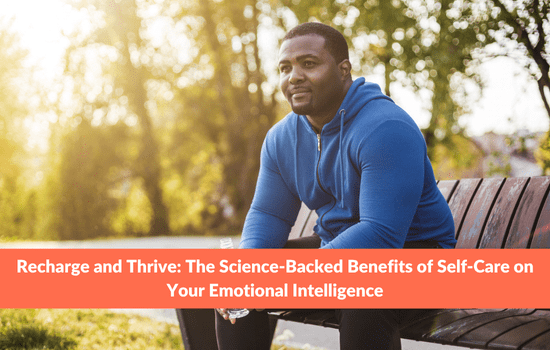In a world that constantly pulls us in every direction, it’s easy to overlook the one habit that truly supports our well-being: self-care. Far from being a luxury, self-care is a science-backed practice that strengthens emotional intelligence, supports consistent self-management, and builds lasting resilience. By prioritizing self-care, we empower ourselves to thrive—not just survive—in both our personal and professional lives.
The Power of Self-Care: How Recharging Fuels Your Emotional Intelligence and Well-Being

Through my work in emotional intelligence, I’ve seen firsthand how investing time in recharging physically, emotionally, and mentally dramatically improves our ability to connect with others and thrive under pressure. This blog explores how self-care promotes emotional regulation and personal success, and why establishing it as a habit is essential for achieving optimal well-being.
Why Self-Care Matters More Than Ever
So many of us forget to care for our most valuable resource—ourselves. When we neglect self-care, we compromise our resilience, increase stress, and negatively impact our emotional intelligence.
Research published in Frontiers in Psychology (2023) found that individuals who practiced consistent self-care routines had significantly higher scores on emotional regulation and lower levels of burnout.
Self-care includes caring for your physical, emotional, and mental health. By doing so, you can strengthen your self-management skills, better navigate daily stressors, and enhance your personal and professional relationships.
Start Your Day with Intentional Self-Care
How you begin your day sets the tone for the next 24 hours. I recommend waking up at least 15 minutes early to ease into your routine. Begin with five deep breaths and a full-body stretch before getting out of bed. Then, calmly visualize your day.
If nothing excites you, schedule something enjoyable—a coffee break with a friend or a short walk outdoors. These simple self-care practices can build a sense of anticipation and positive emotion, which support mental clarity and emotional intelligence.
Balance is the Foundation of Well-Being
A balanced life integrates productivity with restoration. When you actively schedule time for both work and relaxation, your physical and emotional well-being improves. Try not to compare your self-care routines with others—our needs differ, and that’s okay. What matters is honouring your unique path to resilience.
Five Powerful Ways to Recharge Your Mind and Body
As Tyler Ouwendyk, Owner of Momentum Fitness, shares, self-care must be holistic. These five strategies will help recharge you physically, emotionally, and mentally:
-
Move Your Body Daily: Regular physical activity enhances sleep, energy, focus, and mood—key factors that contribute to sustained well-being.
-
Prioritize Sleep Hygiene: Aim for 7–8 hours each night. A dark, cool room and a consistent bedtime are proven to boost cognitive performance and emotional regulation.
-
Fuel Yourself Well: Use the 80/20 nutrition approach. Fueling with whole foods 80% of the time helps maintain stable energy levels and supports long-term resilience and mood.
-
Engage in Joyful Hobbies: Whether it's gardening, walking, knitting, or reading, hobbies recharge your spirit and reinforce self-awareness, a core component of emotional intelligence.
-
Set Clear Boundaries: Blurred work-life boundaries lead to burnout. Using your calendar to carve out time for rest, hobbies, and meals helps enhance self-management and protect your well-being.
These strategies align with findings from a 2022 American Psychological Association study, which found that setting boundaries and prioritizing enjoyable, mindful activities contributed to lower cortisol levels and greater emotional balance.
The Emotional Intelligence Connection
These self-care practices don’t just recharge your energy—they improve your ability to regulate emotions, a cornerstone of emotional intelligence. Enhanced self-management allows us to respond rather than react, especially under pressure.
In my book, The Power of Emotion, I explore how emotionally intelligent leaders develop greater resilience and foster healthier workplace cultures, starting with their well-being. As I often say:
“Checking your emotions and asking yourself why you feel a certain way is essential to healthy self-management.” — Linda Marshall, Author & Marshall Connects President
Final Thoughts: Self-Care Benefits Everyone
When you take care of yourself, everyone benefits. Strong emotional intelligence begins with self-awareness, and that starts with how we treat ourselves. Your well-being is the foundation for all meaningful connections, creative ideas, and impactful work.
Let go of guilt. Embrace balance. Recharge intentionally.
At Marshall Connects, we offer Emotional Intelligence Assessments and Coaching Programs to help individuals and teams develop the essential skills that begin with self-care. Remember: the story you tell yourself each day becomes your reality, so make it a story that prioritizes wellness, balance, and joy.
This article was originally published on September 12, 2020, and has been updated (July 2025).
More Motivational Reads Here »
How Emotionally Intelligent Are You?
Sign up for Linda’s monthly tips to build your Emotional Intelligence and reduce Emotional Hijacking!

















